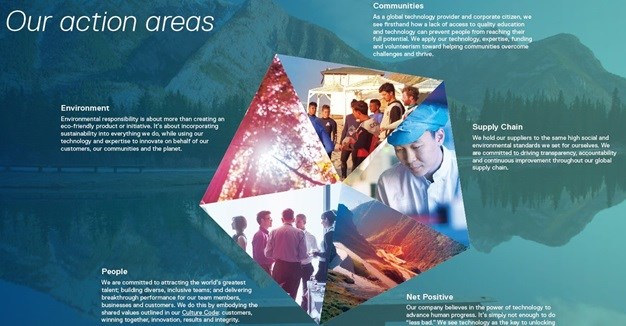#CSIMonth: Leaving a legacy of good

The idea that technology should be a driver of human progress is central to how Dell thinks.
We believe it can unlock health, happiness and prosperity – helping all people reach their full potential and share in the common good. It can fuel the imagination. It can help us heal the sick. It can even help us restore the environment and reveal the mysteries of science. Technology drives what’s good.
Tell us more about the 2020 Legacy of Good plan.
Our Legacy of Good Plan spells out our commitment to put our technology and expertise to work where they can do the most good for people and the planet.
Integrating EMC in September 2016 was an opportunity to become even more ambitious in our aims. Taking the best of the two legacy companies and updating our goals, we are confident in our journey to 2020.
It continues to focus across our value chain, looking at the environment, our communities, our people, and our supply chain, as well as progress against our goals. By 2020, we expect to reduce the energy intensity of our product portfolio by 80%, use only packaging that is 100% compostable or recyclable, and rally our global workforce to give five million volunteer hours to the communities we call home. This is just to name a few.
I think many people may have a limited idea as to what technology companies can do in terms of CSI. For example, donate computers to a school. Dell EMC, however, is bringing about change in many areas. From people and communities to the environment and also supply chain. Elaborate.
Dell believes access to technology is not a luxury, but a necessity. We also believe that technology is the centre of human progress. Our giving initiatives apply Dell’s technology, expertise and volunteers in communities considered underserved or underrepresented for reasons such as poverty, insufficient infrastructure, geographic isolation, disability or illness.
Technology is a powerful tool for breaking down barriers and opening up new possibilities for children around the world. It can give a child living in the streets access to the same information as the most affluent child. It can bring more educational opportunities to remote villages.

The key is connecting technology to those who need it most, and that’s where Dell comes in. South Africa's journey from apartheid to a leading global economic power and cultural force has been swift and rocky. About a quarter of South Africa's population live on less than $1.25 per day, and unemployment remains high. Also, a lack of reliable, affordable electricity and technology access hampers many towns and schools. It is these schools in particular where electricity and technology can drive further progress.
Research shows technology and devices in the classroom help students learn more, more efficiently, and improve the odds of children lifting themselves out of poverty — particularly for young girls. Each Learning Lab, housed in a converted, well-ventilated shipping container, uses solar panels to keep power Wyse thin client workstations that use seven watts of energy, as compared with 180 watts for traditional PCs.
The new labs also have been built with fresh air-cooled servers, a better solution for hotter climates. Bringing technology and connectivity to these students, teachers, and communities open up an entire world of new skills, knowledge, and opportunities.
Why is CSI important to the company?
As a global technology provider and corporate citizen, we see firsthand how a lack of access to quality education and technology can prevent people from reaching their full potential. We apply our technology, expertise, funding and volunteerism toward helping communities overcome challenges and thrive. We do what we do because we care.
Find out more about the Dell Legacy for Good Plan here.




































